Ocelot和Consul 实现网关API 服务注册 负载均衡
Ocelot和Consul 实现网关API 服务注册 负载均衡
Ocelot是一个用.NET Core实现并且开源的API网关,它功能强大,包括了:路由、请求聚合、服务发现、认证、鉴权、限流熔断、并内置了负载均衡器与Service Fabric、Butterfly Tracing集成。这些功能只都只需要简单的配置即可完成
Consul 服务发现
在Ocelot已经支持简单的负载功能,也就是当下游服务存在多个结点的时候,Ocelot能够承担起负载均衡的作用。但是它不提供健康检查,服务的注册也只能通过手动在配置文件里面添加完成。这不够灵活并且在一定程度下会有风险。这个时候我们就可以用Consul来做服务发现,它能与Ocelot完美结合。
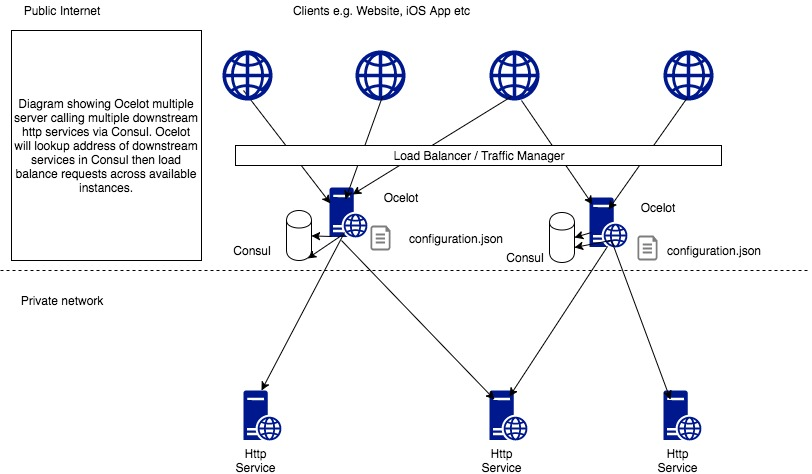
Consul是什么
Consul是一个服务网格(微服务间的 TCP/IP,负责服务之间的网络调用、限流、熔断和监控)解决方案,它是一个一个分布式的,高度可用的系统,而且开发使用都很简便。它提供了一个功能齐全的控制平面,主要特点是:服务发现、健康检查、键值存储、安全服务通信、多数据中心。
安装Consul:windos环境
https://www.consul.io/downloads.html 下载文件
放到D盘下
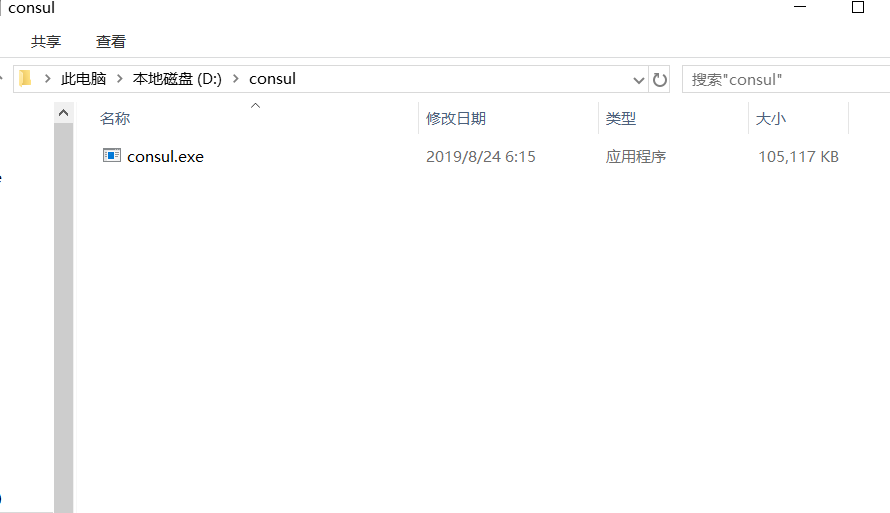
打开powershell 执行 命令启动一个Agent的开发模式:
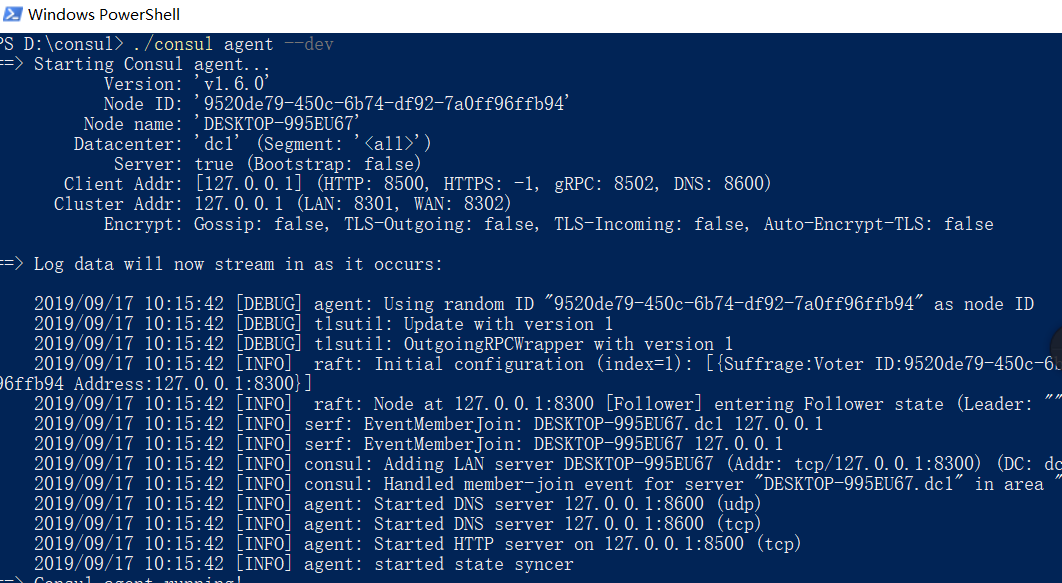
启动完成:打开localhost:8500 默认端口8500 就可以看到一个可视化consul界面了,可以看到默认启动了一个consul 服务
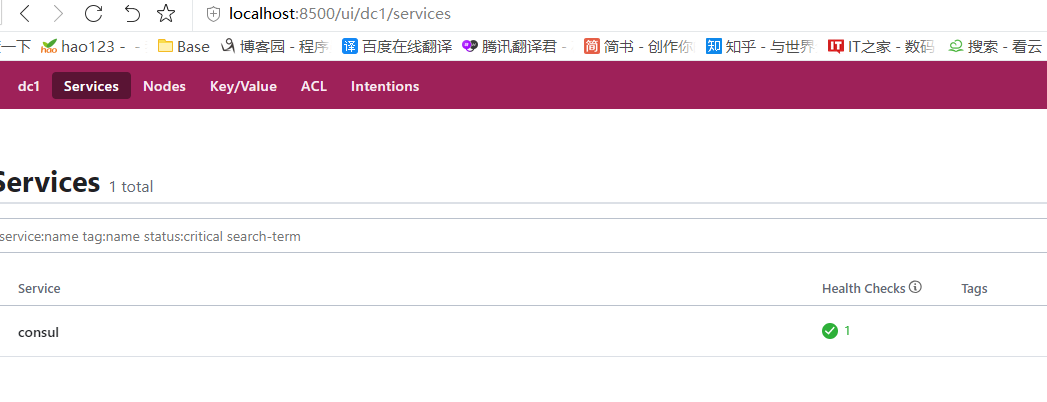
下面,使用netcore通过Ocelot搭建API网关 服务注册 负载均衡
新建一个api1:nuget 添加一个consul 依赖
startup 添加代码
public void Configure(IApplicationBuilder app, IHostingEnvironment env, IApplicationLifetime lifetime) { if (env.IsDevelopment()) { app.UseDeveloperExceptionPage(); } //注册项目启动的方法 lifetime.ApplicationStarted.Register(OnStart); //注册项目关闭的方法 lifetime.ApplicationStarted.Register(OnStopped); app.UseMvc(); } //关闭的时候在consul中移除 private void OnStopped() { var client = new ConsulClient(); //根据ID在consul中移除当前服务 client.Agent.ServiceDeregister("servicename:93"); } private void OnStart() { var client = new ConsulClient(); //健康检查 var httpCheck = new AgentServiceCheck() { //服务出错一分钟后 会自动移除 DeregisterCriticalServiceAfter = TimeSpan.FromMinutes(1), //每10秒发送一次请求到 下面的这个地址 这个地址就是当前API资源的地址 Interval = TimeSpan.FromSeconds(10), HTTP = $"http://localhost:93/HealthCheck" }; var agentReg = new AgentServiceRegistration() { //这台资源服务的唯一ID ID = "servicename:93", Check = httpCheck, Address = "localhsot", Name = "servicename", Port = 93 }; client.Agent.ServiceRegister(agentReg).ConfigureAwait(false); }
添加一个健康检查接口
[Route("HealthCheck")] [ApiController] public class HealthCheckController : ControllerBase { // GET: api/HealthCheck [HttpGet] [HttpHead] public IActionResult Ping() { return Ok(); } }
修改ValuesController
[Route("api/[controller]")] [ApiController] public class ValuesController : ControllerBase { // GET api/values [HttpGet] public string Get() { return "这是1资源服务器API"; } }
添加项目 Api.Gateway(Ocelot网关服务器) 添加Ocelot包 添加Ocelot.Json配置 Ocelot服务器端口为91
Ocelot,Json
{ "ReRoutes": [ { //暴露出去的地址 "UpstreamPathTemplate": "/api/{controller}", "UpstreamHttpMethod": [ "Get" ], //转发到下面这个地址 "DownstreamPathTemplate": "/api/{controller}", "DownstreamScheme": "http", //资源服务器列表 "DownstreamHostAndPorts": [ { "host": "localhost", "port": 92 }, { "host": "localhost", "port": 93 } ], //决定负载均衡的算法 "LoadBalancerOptions": { "Type": "LeastConnection" }, "UseServiceDiscovery": true } ], //对外暴露的访问地址 也就是Ocelot所在的服务器地址 "GlobalConfiguration": { "BaseUrl": "http://localhost:91" } }
Startup 修改
public void ConfigureServices(IServiceCollection services) { services.AddOcelot(); services.AddMvc().SetCompatibilityVersion(CompatibilityVersion.Version_2_2); } // This method gets called by the runtime. Use this method to configure the HTTP request pipeline. public void Configure(IApplicationBuilder app, IHostingEnvironment env) { if (env.IsDevelopment()) { app.UseDeveloperExceptionPage(); } app.UseOcelot().Wait(); app.UseMvc(); }
Program 修改
public class Program { public static void Main(string[] args) { CreateWebHostBuilder(args).Build().Run(); } public static IWebHostBuilder CreateWebHostBuilder(string[] args) => WebHost.CreateDefaultBuilder(args) .ConfigureAppConfiguration((hostingContext, builder) => { builder .SetBasePath(hostingContext.HostingEnvironment.ContentRootPath) .AddJsonFile("Ocelot.json"); }) .UseUrls("http://+:91") .UseStartup<Startup>(); }
启动 api3 和api2

再启动Api.Gateway
执行 http://localhost:91/api/values

再执行
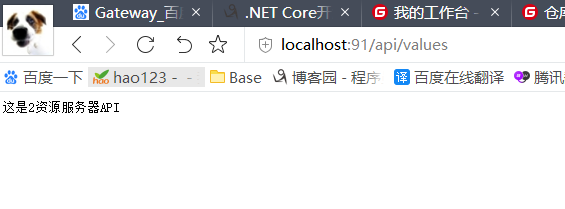
我们这里负载均衡算法是:LeastConnection
当然还可以选择其他的:
- RoundRobin - 轮询,挨着来
- LeastConnection - 最小连接数,谁的任务最少谁来
- NoLoadBalance - 不要负载均衡
如果api1 我们关掉 ,那么就只会请求到api2 ,api1的服务自动断开

